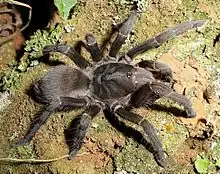Acanthoscurria gomesiana
Acanthoscurria gomesiana is a species of tarantula first identified in Brazil in 1923.[1] It is known for producing the gomesin peptides, a class of proteins which have found to have anti-tumour and anti-microbial properties.[2][3][4]
| Acanthoscurria gomesiana | |
|---|---|
 | |
| Acanthoscurria gomesiana ♀ | |
| Scientific classification | |
| Domain: | Eukaryota |
| Kingdom: | Animalia |
| Phylum: | Arthropoda |
| Subphylum: | Chelicerata |
| Class: | Arachnida |
| Order: | Araneae |
| Infraorder: | Mygalomorphae |
| Family: | Theraphosidae |
| Genus: | Acanthoscurria |
| Species: | A. gomesiana |
| Binomial name | |
| Acanthoscurria gomesiana Mello-Leitão, 1923 | |
References
- "Acanthoscurria gomesiana Mello-Leitão, 1923". www.tarantupedia.com. Retrieved 2018-10-09.
- Fernandez-Rojo, Manuel A.; Deplazes, Evelyne; Pineda, Sandy S.; Brust, Andreas; Marth, Tano; Wilhelm, Patrick; Martel, Nick; Ramm, Grant A.; Mancera, Ricardo L. (2018-02-14). "Gomesin peptides prevent proliferation and lead to the cell death of devil facial tumour disease cells". Cell Death Discovery. 4 (1): 19. doi:10.1038/s41420-018-0030-0. ISSN 2058-7716. PMC 5841354. PMID 29531816.
- "Gomesin precursor - Acanthoscurria gomesiana (Tarantula spider)". www.uniprot.org. Retrieved 2018-10-09.
- Tanner, John D.; Deplazes, Evelyne; Mancera, Ricardo L. (2018-07-16). "The Biological and Biophysical Properties of the Spider Peptide Gomesin". Molecules (Basel, Switzerland). 23 (7): 1733. doi:10.3390/molecules23071733. ISSN 1420-3049. PMC 6099743. PMID 30012962.
This article is issued from Wikipedia. The text is licensed under Creative Commons - Attribution - Sharealike. Additional terms may apply for the media files.